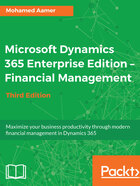
Understanding ERP characteristics
ERP is a mission-critical application for business, as day-to-day activities rely on this application where the end users enter transactions and the management is able to monitor the business performance on a daily basis and take decisions within a proper time period. The ERP application has different characteristics from any other application, and these characteristics are mentioned in the Wikipedia definition:
From this definition, ERP is an integrated application. In the past, each business area had its own application, and this led to the creation of isolated islands for each department in the same organization; these cost the organization time, effort, and money. This led to a lack of accurate information, which directly affects management decision making, because of the unavailability or redundancy of information; for example, a customer account in accounts receivable (Finance department) is different from a customer code in the Sales department, so the management can't identify the customer's balance. With ERP, the data is unified, controlled, and classified. This gives the company the ability to transform this data into information that helps in the decision-making process. In the modern world, the deployment of ERP has been moved to the cloud as a reaction to rapid customer business needs; the cloud provides the opportunity for business to respond to business scalability, reliability, and agility. The ERP application has taken its position in cloud technology, and we are witnessing an evolving revolution, and we contributing to it.